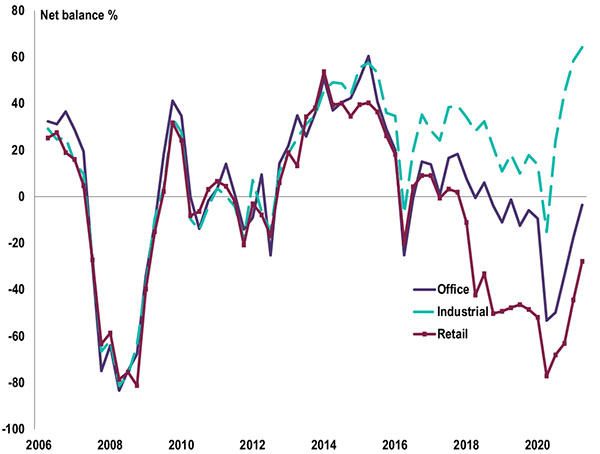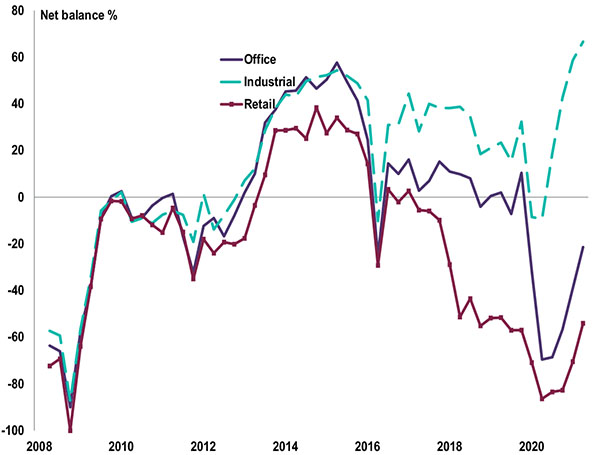Upgrade to UK GDP growth
 The Office for National Statistics (ONS) has revised UK economic growth for Q2 2021 to 5.5% from an original estimate of 4.8%. The UK’s level of GDP is now 3.3% below where it was pre-pandemic in Q4 2019, revised from the previous estimate of 4.4% below.
The Office for National Statistics (ONS) has revised UK economic growth for Q2 2021 to 5.5% from an original estimate of 4.8%. The UK’s level of GDP is now 3.3% below where it was pre-pandemic in Q4 2019, revised from the previous estimate of 4.4% below.
Other ONS data indicates a loss of momentum more recently, with the economy growing by 0.1% in July. Although this represents a sixth successive month of growth, the figure was lower than June’s 1.4% rise and below the 0.6% average forecast predicted in a Reuters poll of economists.
July’s slowdown partly reflects an upsurge in COVID cases and the resulting ‘pingdemic’, with ONS saying some businesses complained of staff being unable to attend work due to self-isolation requirements. Additionally, analysts said the slowdown highlighted the impact of supply chain disruptions.
More recent survey data also shows supply chain issues continue to weigh on the recovery. The closely watched IHS Markit/CIPS flash composite Purchasing Managers’ Index (PMI), for instance, fell from 54.8 in August to 54.1 in September. While any reading above 50 does still imply growth, this was a fourth consecutive monthly decline, signalling a loss of momentum across the UK private sector.
IHS Markit’s Chief Business Economist Chris Williamson said,
“The survey also points to business activity being increasingly constrained by shortages of materials and labour, most notably in the manufacturing sector but also in some services firms. A lack of staff and components were especially widely cited as causing falls in output within the food, drink and vehicle manufacturing sectors.“
Back to top
BoE raises inflation forecast
 The Bank of England (BoE) recently increased its near-term inflation forecast and signalled that the case for a ‘modest‘ tightening of monetary policy over the next few years has ‘strengthened‘.
The Bank of England (BoE) recently increased its near-term inflation forecast and signalled that the case for a ‘modest‘ tightening of monetary policy over the next few years has ‘strengthened‘.
At a meeting ending on 22 September, the BoE’s Monetary Policy Committee (MPC) voted unanimously to leave interest rates unchanged at the historic low of 0.1% and to maintain its existing economic stimulus programme by a majority of seven votes to two. However, growing concerns with regards to cost pressures were expressed, with the minutes to the meeting stating that, ‘inflation is expected to rise further in the near term, to slightly above 4% in 2021 Q4, owing largely to developments in energy and goods prices.‘
While stressing no immediate action was currently required, the MPC did announce it had dropped previous guidance stating it would not consider tightening monetary policy until the economy had recovered materially from the pandemic. It also stated that recent developments had ‘strengthened‘ the case for ‘modest tightening‘ over the Bank’s forecast period.
Although the MPC minutes again reiterated the Bank’s ‘central expectation’ that current global price pressures will prove ‘transitory,’ the latest data does suggest inflationary pressures have intensified in recent months. Statistics released by ONS, for example, revealed a record monthly jump in the Consumer Prices Index (CPI). In August, this measure of annual inflation rose to 3.2%, up from 2.0% in July and 0.3% higher than the consensus forecast in a Reuters poll of economists.
Furthermore, data from the latest IHS Markit/CIPS PMI suggest inflationary pressures show little sign of abating. Input costs were reported to have increased sharply in September, with businesses attributing the rise to higher wage costs, the impact of supply chain disruption and rising transportation costs; and in response, firms increased their selling prices at the greatest pace on record.
Back to top
Markets: (Data compiled by TOMD)
As the third quarter drew to a close, supply chain concerns and fears of higher inflation, impacted market sentiment. In the UK, London’s indices slipped back at month end, after better-than-expected economic growth data renewed speculation that an interest rate increase could be on the cards. The FTSE 100 ended the month on 7,086.42, a small loss of 0.47%. The FTSE 250 index closed on 23,031.29, a monthly loss of 4.44%. The Junior AIM index closed on 1,243.82.
US stocks moved lower at month end, even after a spending bill was passed to avert a US government shutdown. Investors are bracing for a wind-down in stimulus, amid growing concerns about economic growth. In the US, the Dow Jones ended the month down 4.29% to close on 33,843.92 and the NASDAQ recorded a loss of 5.31%.
In Japan, the Nikkei 225 gained 4.85% in the month, to close on 29,452.66. Led by cyclical stocks, sentiment was boosted by progress in domestic vaccine rollouts, raising hopes for an economic reopening. The Euro Stoxx 50 lost 3.53% in the month to close on 4,048.08.
On the foreign exchanges, sterling closed the month at $1.34 against the US dollar. The euro closed at €1.16 against sterling and at $1.15 against the US dollar.
Oil prices have been rising on the back of the energy crisis in Europe. Analysts believe oil prices will continue to rise amid surging demand. Brent Crude is currently trading at around $78 per barrel, a gain of over 9% on the month. The gold price rose over 2% on the last trading day of the month, after the dollar fell on poor US weekly jobs numbers, but recent declines, driven by expectations the Fed will soon start tapering economic support, kept gold on track for a monthly and quarterly fall. Gold is currently trading at around $1,730 a troy ounce, a loss of around 4.5% over the month.
| Index |
Value
(30/09/21) |
|
% Movement
(since 31/08/21) |
 FTSE 100 FTSE 100 |
7,086.42 |
 |
0.47% |
 FTSE 250 FTSE 250 |
23,031.29 |
 |
4.44% |
 FTSE AIM FTSE AIM |
1,243.82 |
 |
3.80% |
 EURO STOXX 50 EURO STOXX 50 |
4,048.08 |
 |
3.53% |
 NASDAQ Composite NASDAQ Composite |
14,448.58 |
 |
5.31% |
 DOW JONES DOW JONES |
33,843.92 |
 |
4.29% |
 NIKKEI 225 NIKKEI 225 |
29,452.66 |
 |
4.85% |
Back to top
Job vacancies hit record high
ONS data has revealed that job vacancies now stand at an all-time high as employers report the most severe shortage of job candidates on record.
The latest employment statistics show the labour market continues to recover from the pandemic, with the number of people in pay rolled employment rising by a further 241,000 in August. This lifts the total number of employees on company payrolls to 29.1 million, slightly above pre-pandemic levels.
Despite this rise, demand for staff remains high, with the official number of job vacancies passing the one million mark for the first time since records began in 2001. While the end of furlough will inevitably bring some people back into the jobs market, the Confederation of British Industry has warned it will not be a ‘panacea‘ that will ‘magically fill labour supply gaps.’
A survey by the Recruitment and Employment Confederation recently reported the most severe shortage of job candidates on record, and business groups have said the government decision to grant temporary visas to 5,000 HGV drivers and 5,500 poultry workers will have little impact on the situation. Indeed, the British Chambers of Commerce likened the move to ‘throwing a thimble of water on a bonfire.’
Back to top
Retail sales in downward trend
Although retail sales volumes remain above pre-pandemic levels, August’s official data revealed a record fourth consecutive monthly decline, while survey evidence points to a continuation of this trend in September.
According to ONS figures, retail sales fell unexpectedly in August, with volumes 0.9% lower than July. This fall partly reflects a spending switch from supermarkets to restaurants following the removal of hospitality restrictions, while retailers also said supply chain disruption had hit sales. Downward revisions to previous months’ data also mean volumes have now been steadily declining since April’s lockdown easing peak.
Data from the latest Distributive Trades Survey published by the Confederation of British Industry (CBI) also suggests this downturn continued last month with sales growth slowing to a six-month low in September. In addition, the survey reported stock levels relative to expected sales across the distribution sector at a record low.
Commenting on these supply chain difficulties, CBI Principal Economist Ben Jones said, “Low stock adequacy remains a concern across the distribution sector. Respondents to our survey have told us that they do not expect the transport and production issues that are causing these shortages to ease significantly until at least next year and, in some cases, beyond.“
Back to top
It is important to take professional advice before making any decision relating to your personal finances. Information within this document is based on our current understanding and can be subject to change without notice and the accuracy and completeness of the information cannot be guaranteed. It does not provide individual tailored investment advice and is for guidance only. Some rules may vary in different parts of the UK. We cannot assume legal liability for any errors or omissions it might contain. Levels and bases of, and reliefs from, taxation are those currently applying or proposed and are subject to change; their value depends on the individual circumstances of the investor. No part of this document may be reproduced in any manner without prior permission.





 The Office for National Statistics (ONS) has revised UK economic growth for Q2 2021 to 5.5% from an original estimate of 4.8%. The UK’s level of GDP is now 3.3% below where it was pre-pandemic in Q4 2019, revised from the previous estimate of 4.4% below.
The Office for National Statistics (ONS) has revised UK economic growth for Q2 2021 to 5.5% from an original estimate of 4.8%. The UK’s level of GDP is now 3.3% below where it was pre-pandemic in Q4 2019, revised from the previous estimate of 4.4% below.  The Bank of England (BoE) recently increased its near-term inflation forecast and signalled that the case for a ‘modest‘ tightening of monetary policy over the next few years has ‘strengthened‘.
The Bank of England (BoE) recently increased its near-term inflation forecast and signalled that the case for a ‘modest‘ tightening of monetary policy over the next few years has ‘strengthened‘.





